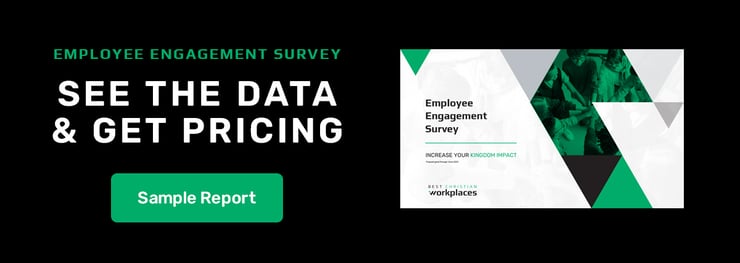Is Your Workplace Culture Truly Healthy—Or Just Surviving?
Leaders of Christian-led organizations carry the responsibility of stewarding both mission and people. But when it comes to the health of your staff...
4 min read
 Al Lopus
:
April, 06 2021
Al Lopus
:
April, 06 2021

The last 13 months have brought incredible change to the way we live and work. The COVID-19 pandemic has resulted in a lot of dramatic changes and a great deal of anxiety. Thousands of organizations and employees had to transition quickly from traditional office environments to remote work situations. Others faced layoffs or reductions in hours. For some, the transition wasn’t as difficult as it was for many others, but we have all been impacted both personally and organizationally. The way many of us work has changed. And change impacts employee engagement. With the rollout of the COVID-19 vaccine happening now, new decisions will need to be made about the sustainability and value of remote work arrangements. Obtaining feedback from employees and making appropriate adjustments will be critical to building or re-building employee engagement.
The health of your organizational culture and the strength of your employee engagement have a real impact on the success of your organization and how effectively you accomplish your mission and vision. As the new “normal” continues to evolve, now is an excellent time to survey staff and evaluate your current levels of employee engagement and the health of your organizational culture.
So why survey now? Think of an engagement survey as your organization's "annual physical". How many of us have put off our annual physical until we lose a few pounds or improve our exercise regimen? It is easy to think about waiting to survey employees until things get better or we’ve made some changes. Here are five reasons to conduct an employee engagement survey now:
Your people make your organization what it is. Organizational success is significantly impacted by the caliber of people an organization attracts. Outstanding talent is the third building block of BCWI's eight drivers of healthy workplace culture. While our organization might have great people, many employees may not feel safe sharing their thoughts and experiences with leadership. BCWI’s Employee Engagement Survey gives your employees a venue to provide open and honest feedback anonymously. It is an opportunity to involve employees in the development process by giving them a direct voice to leadership.
Often there are a few loud voices surrounding a particular problem or issue, and these drown out others who may not be as vocal. The survey gives leadership the opportunity to hear firsthand what employees are thinking but in an objective format.
Mike Kremnitzer, the director of benefits and HR for the West Ohio Conference of the United Methodist Church, recently shared in our Flourishing Culture Podcast (Season 5, Episode 22 "Healthy Culture Provides Stability in the Midst of Uncertainty) he viewed the survey as a “mirror“. “It would be an objective look inside our organization and really give an accurate representation of our culture, a mirror that basically shows us for who we really are and our outward appearance."
We know things are not as we would like them to be. Mike noted that as an organization they were broken and needed to be fixed. It was a hard truth to face, but once they were able to move past the hurt, they knew the only way to go was up. “If your culture’s hurting, then, no doubt, your people are hurting, which actually means you’re in a great place…you know change is needed and you’re on the doorstep of change”.
If things are difficult, it takes courage to acknowledge the issues. Another ministry leader, Kevin McKee, Senior Pastor from The Chapel in Baton Rouge, LA, shared in his Flourishing Culture Podcast (Season 6, Episode 7, 7 Steps to Move from Toxic to Flourishing Workplace Culture) that their survey scores dropped two years in a row. They knew there was a problem, but the survey helped them identify what the problem was so they could begin to address it.
The survey will reveal areas that need improvement, but it also gives you the opportunity to celebrate your strengths and identify ways to build upon them.
Benchmarking will allow you to evaluate the data for comparison purposes. The importance of benchmarking salary data to ensure your organization's pay practices are in line with the competition. You can look at particular survey results and compare them against similarly situated organizations. This allows the opportunity to identify issues that may be specific to your organization or common challenges faced by organizations similar to you. It can put your results in context and help you prioritize actions that are necessary to drive greater employee engagement.
In future years, benchmarking also allows you to examine your current results versus the prior year’s results and compare the scores of different teams within the organization over time. This can help you see trends and identify strengths that can be built upon.
Our team will work with you to help you understand the results and create an action plan to move towards greater organizational health and employee engagement. In the face of many issues, it will be impossible to address them all. Choose what matters. Identify the critical, foundational issues that need to be addressed and start there.
Growth and change are part of any successful organization and are rarely easy. Leaders have to make hard choices. Often this means adjusting people so that the right people are in the right positions where they will be most effective. It may mean letting people go. It may also mean changing processes or methods, identifying development and training needs, etc.
Addressing hard issues, in the long run, can help minimize costs. As employee engagement increases, innovation and productivity increase, employee turnover is reduced and client satisfaction increases, to name just a few ways it can impact the bottom line.
Organizations that have high levels of employee engagement are often characterized as having high levels of trust between employees and leadership. The BCWI Engagement Survey can be a catalyst to helping your organization begin to build both.
The first step is to share insights gained from the survey with staff. Engage in two-way communication, facilitating open, ongoing feedback, asking good questions, listening, and connecting with employees. Doing so may require vulnerability from the leaders as they take responsibility for decisions that have negatively impacted the culture. Kevin McKee, Senior Pastor of The Chapel, acknowledged that some staff had trust issues because of problems that were unaddressed over a long period of time. When the problems were acknowledged and dealt with, healing began to take place. Over time, trust was rebuilt and together they have developed a thriving organizational culture.
Change must begin with the leadership, but engaging employees in helping make positive change in the organization is another key to building trust and employee engagement. Providing the opportunity for employees to have ownership in the growth and improvement of the organizational culture deepens their engagement and leads to change that is sustainable.
Quick fixes will rarely produce lasting change or strengthen relationships. Building trust and sustainable culture change require commitment, clear communication, accountability, and the investment of time and resources. As Mike Kremnitzer said in the podcast, “you can have the best laid-out plans, but if your culture isn't healthy, you'll never achieve your organizational objectives. You'll always come short of where you can be.”
Our consulting team will partner with you to provide resources, support, encouragement, and accountability to help you move your organizational culture towards health. We would love to talk with you personally about the process. For more information on BCWI's Employee Engagement Survey or to sign up, contact our team.
###


Leaders of Christian-led organizations carry the responsibility of stewarding both mission and people. But when it comes to the health of your staff...

Brian Mosley, RightNow Media

Recently, I was talking with a Ministry Partner who is committed to workplace health but unsure of the value of an annual Employee Engagement Survey.